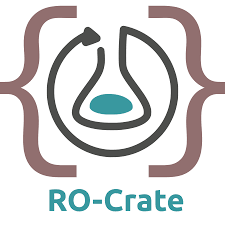Module: FAIR data and provenance with RO-Crate and Galaxy
RO-Crate is a community effort to practically achieve FAIR packaging of research objects (digital objects like data, methods, software) with structured metadata. RO-Crate uses well-established Web standards and FAIR principles.
For its metadata representations, RO-Crate builds on schema.org, a mature vocabulary understood by search engines including Google Dataset Search. RO-Crate is adopted by many EU/EOSC projects as a pragmatic implementation of the FAIR Digital Objects vision.
Galaxy has recently added RO-Crate support as a way to preserve a workflow and its execution history. RO-Crate is also used to deposit Galaxy workflows in the WorkflowHub registry from resources such as the Intergalactic Workflow Commission.
In this module you will learn about RO-Crate as a concept and technology for FAIR data packaging, with hands-on exercises for making and publishing a crate manually, programmatically, and using Galaxy.
Additional sessions will teach how to capture provenance of any workflow execution, how to follow best practices for publishing Galaxy workflows in WorkflowHub, and how to submit workflows to the LifeMonitor testing framework.
This module is created in collaboration with ELIXIR, BY-COVID, EOSC-Life, FAIR-IMPACT and EuroScienceGateway.
Building RO-Crates
Speaker
Publishing My First™ RO-Crate
 This is a self-study session. Please work through the materials on your own, and ask the instructors for help if you get stuck or have any questions!
This is a self-study session. Please work through the materials on your own, and ask the instructors for help if you get stuck or have any questions!
Instructor
RO-Crate in Python
 This is a self-study session. Please work through the materials on your own, and ask the instructors for help if you get stuck or have any questions!
This is a self-study session. Please work through the materials on your own, and ask the instructors for help if you get stuck or have any questions!
Instructor
Workflow Run RO-Crate Introduction
 This is a self-study session. Please work through the materials on your own, and ask the instructors for help if you get stuck or have any questions!
This is a self-study session. Please work through the materials on your own, and ask the instructors for help if you get stuck or have any questions!
Instructor
Publishing Workflow RO-Crates with Galaxy
Best practices for workflows in GitHub repositories
 This is a self-study session. Please work through the materials on your own, and ask the instructors for help if you get stuck or have any questions!
This is a self-study session. Please work through the materials on your own, and ask the instructors for help if you get stuck or have any questions!
Instructor
Submitting workflows to LifeMonitor
 This is a self-study session. Please work through the materials on your own, and ask the instructors for help if you get stuck or have any questions!
This is a self-study session. Please work through the materials on your own, and ask the instructors for help if you get stuck or have any questions!
